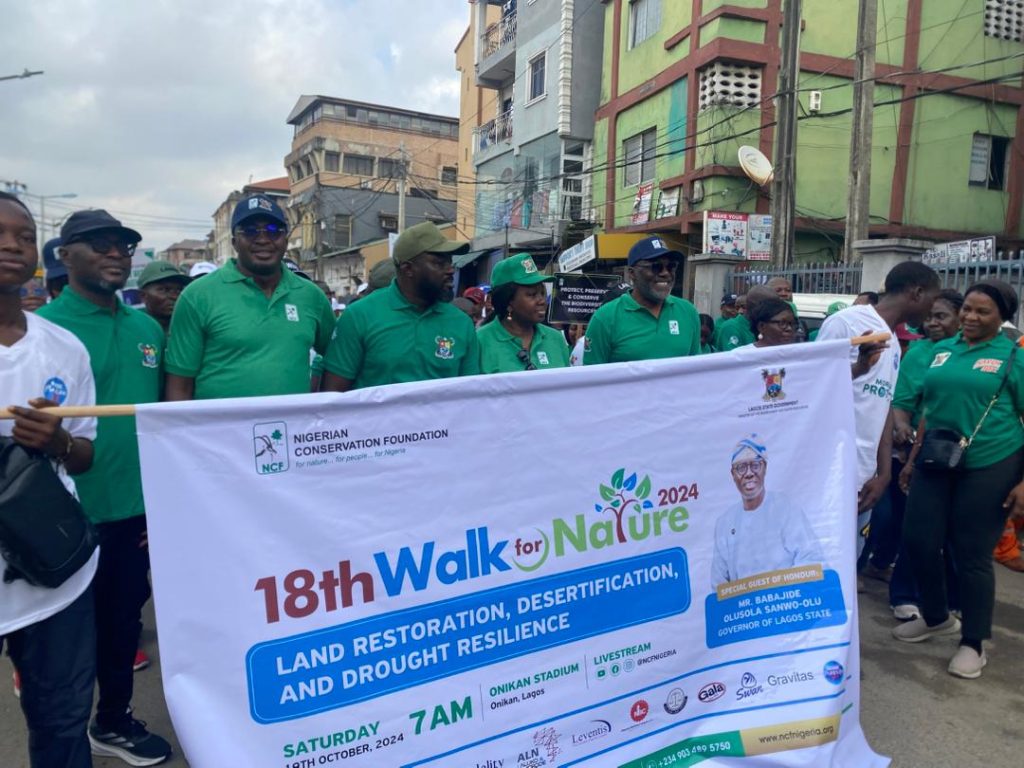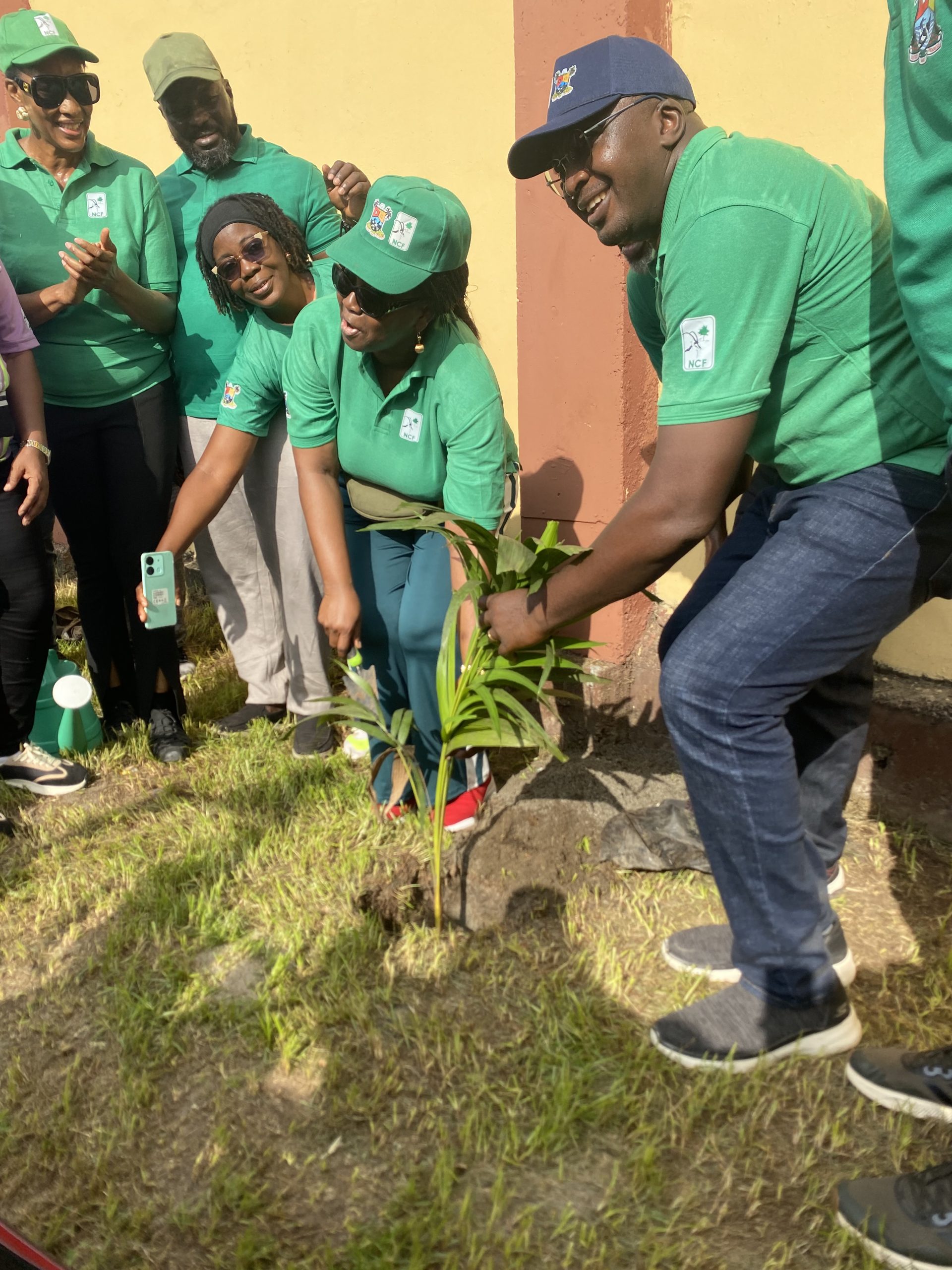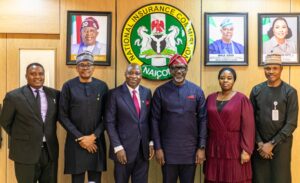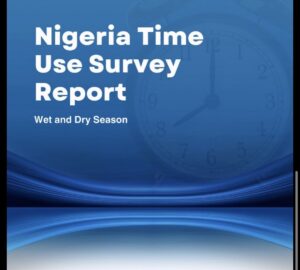Lagos, NCF create awareness on environmental protection

Abdullateef Fowewe
The 18th edition of the annual Walk for Nature, a collaboration between the Lagos State Government and the Nigerian Conservation Foundation (NCF), commenced on Saturday with a mission to raise awareness for a healthier environment.
This year’s theme aligns with the United Nations 2024 World Environment Day, focusing on “Land Restoration, Combating Desertification, and Building Drought Resilience.”
The event which was held in Onikan Stadium, Onikan, Lagos State on Saturday, underscored Nigeria’s vulnerability to climate change and emphasised the importance of land restoration efforts, including NCF’s Green Recovery Nigeria initiative, which has successfully planted over 2 million trees since 2019.
It included a walk of 4.5 kilometres from Onikan Stadium to JK Randle Road, through TBS to Broad Street (inner Marina) to Ganiyu Smith Road by Freedom Park to Igbosere Road, taking a right turn down Igbosere Road to Lawson St junction back to King George and back to Onikan Stadium; it also featured planting of flowers in front of the stadium, and concluded with an invitation for all to participate in the 2025 edition.
Participants were urged to engage in sustainable practices to protect natural resources and enhance community resilience.
Justice R.I.B Adebiyi, who led the NCF, in her remark, emphasised that desertification, driven by climate change, overgrazing, and unsustainable farming practices, poses a significant threat to Nigeria’s drylands, which constitute about 40% of the world’s land surface.
She said, “Building drought resilience helps ecosystems, communities, and economies to withstand and recover from the impacts of a prolonged period of water scarcity. As climate change intensifies, droughts are becoming more frequent and severe, especially in arid and semi-arid regions. Building drought resilience is essential for ensuring food security, protecting livelihoods, and sustaining ecosystems.
“NCF is at the forefront of advocating for concerted efforts that will lead to building synergy between Land Restoration, Combating Desertification, and Drought Resilience thereby enabling sustainable development and climate action. These efforts continue to ensure the protection of ecosystems, support food security, enhance water availability, and improve the livelihoods of communities in vulnerable regions. Global, national, and local collaboration is essential to ensure that these challenges are met with innovative and sustainable solutions. As Organisations, Communities and individuals we can all each take at least one action to restore our lands.”
Adebiyi expressed gratitude to key partners, stating, “I would like to express my deepest appreciation to our financial partners, co-workers in Conservation, and the Lagos State Government under the able and dynamic leadership of Mr. Babajide Olusola Sanwo-Olu.”
Speaking at the event, the Commissioner of Environment and Water Resources, Tokunbo Wahab, who was represented by the Senior Adviser to Governor Babajide Sanwo-Olu on Environment, Olakunle Rotimi-Akodu, emphasised the need for continuous advocacy to combat land degradation, enhance food security, and mitigate climate change effects, highlighting the importance of community engagement in fostering a sustainable environment for future generations.

He said, “The theme this year is a pointer to the challenges being faced globally as a result of natural factors, anthropogenic factors and unsustainable practices within the environment. There is no gainsay that the challenges of human activities have become evident with the escalating impact of the depreciation of natural resources resulting in land and habitat loss affecting biodiversity and increasing the effect of Climate change.
“Land degradation, desertification and drought are interconnected challenges affecting the livelihood of people worldwide, these issues are exacerbated by deforestation, overgrazing, unsustainable land uses such as soil erosion and depreciation and so on. The loss of fertile land space and declining biodiversity increase the vulnerability of our ecosystem, having far-reaching consequences on food security and human well-being. Lagos being a coastal city is shielded from the dry wind of desertification and drought from the Sahara. However, the state is affected by the effect of climate change such as coastal erosion and land degradation.
“To this end, climate resilient actions are been encouraged by the State Government in line with the THEMES PLUS agenda of Mr Governor in encouraging tree planting, building of more parks and gardens, collaboration with NGOs on environmental sustainability and the launching of the Lagos Climate Adaptation and Resilience Plan (LCARP).”
Wahab applauded the NCF for its efforts in conserving 78 hectares of land in Lekki, which serves as a vital buffer against climate change impacts while protecting biodiversity, emphasising the importance of private-sector partnerships in achieving a sustainable environment.




